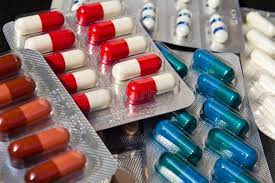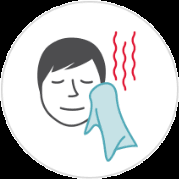
Sinusitis, commonly known as a sinus infection, is a condition in which the lining of the sinuses becomes inflamed and swollen. The sinuses are air-filled spaces in the bones of the face and skull, which help to filter and moisten the air we breathe. In this article, we will explore the causes of sinusitis and how it can be treated.
Causes of Sinusitis:
- Viral infections: The most common cause of sinusitis is a viral infection, such as the common cold or flu. These infections can cause inflammation and swelling of the sinuses, leading tosinusitis.
- Bacterial infections: In some cases, a bacterial infection may be the cause of sinusitis. This is more common in people with weakened immune systems or those who have frequent allergies or asthma.
- Allergies: Allergic reactions to pollen, dust, or pet dander can cause inflammation and swelling of the sinuses, leading to sinusitis.
- Structural abnormalities: Structural abnormalities in the nose or sinuses, such as a deviated septum or nasal polyps, can block the sinuses and lead to sinusitis.
- Environmental irritants: Exposure to environmental irritants such as cigarette smoke, pollution, or chemical fumes can irritate the sinuses and lead to sinusitis.
Treatment of Sinusitis:
- Rest and hydration: Resting and staying hydrated can help to alleviate symptoms of sinusitis and promote healing.
- Pain relief: Over-the-counter pain relievers such as acetaminophen or ibuprofen can help to relieve pain and reduce inflammation.
- Nasal irrigation: Nasal irrigation with a saline solution can help to flush out mucus and relieve congestion.
- Antibiotics: If sinusitis is caused by a bacterial infection, antibiotics may be prescribed to help clear the infection.
- Allergy treatment: If sinusitis is caused by allergies, allergy treatment such as antihistamines or nasal corticosteroids may be recommended.
- Surgery: In severe cases of sinusitis that do not respond to other treatments, surgery may be necessary to remove blockages or correct structural abnormalities.
There are several modern methods of treatment available that can help to alleviate symptoms and promote healing.
Some of the modern methods of treatment for sinusitis:

- Balloon Sinuplasty: Balloon Sinuplasty is a minimally invasive procedure that is used to treat chronic sinusitis. During the procedure, a small balloon catheter is inserted into the sinuses and inflated to open up the sinus passages. This allows for better drainage of mucus and can alleviate symptoms such as congestion and facial pain.

- Endoscopic Sinus Surgery: Endoscopic Sinus Surgery is a minimally invasive surgical procedure that is used to treat severe cases of sinusitis. During the procedure, a small endoscope is inserted into the sinuses to allow the surgeon to see and remove any blockages or damaged tissue. This can help to alleviate symptoms and promote healing.

- Steroid Nasal Sprays: Steroid nasal sprays are a type of medication that is used to treat the inflammation and swelling associated with sinusitis. They work by reducing inflammation in the nasal passages and sinuses, which can help to alleviate symptoms such as congestion and facial pain.

- Antibiotics: Antibiotics are a type of medication that is used to treat bacterial infections that may be causing sinusitis. They work by killing the bacteria that are causing the infection, which can help to alleviate symptoms and promote healing.

- Allergy Treatment: Allergy treatment such as antihistamines or nasal corticosteroids may be recommended for sinusitis that is caused by allergies. These medications work by reducing the inflammation and swelling associated with allergic reactions, which can help to alleviate symptoms and prevent future episodes of sinusitis.
- Immune System Modulators: Immune system modulators such as immunoglobulin therapy may be recommended for patients with frequent or severe sinus infections. These therapies work by boosting the immune system’s ability to fight off infections, which can help to prevent future episodes of sinusitis.
While medical treatment may be necessary for severe or chronic cases of sinusitis, there are several home remedies that can help to alleviate symptoms and promote healing.
Some of the most effective home remedies for sinusitis:

- Nasal Irrigation: Nasal irrigation involves flushing out the sinuses with a saline solution. This can help to remove excess mucus and allergens, which can alleviate symptoms such as congestion and facial pain. You can use a neti pot or nasal spray to perform nasal irrigation.

- Steam Inhalation: Steam inhalation can help to relieve congestion and promote healing of the sinuses. You can do this by filling a bowl with hot water and inhaling the steam, or by taking a hot shower.

- Warm Compresses: Applying warm compresses to the face can help to relieve facial pain and pressure associated with sinusitis. You can use a warm, damp towel or a heated compress for this purpose.

- Drink Plenty of Fluids: Drinking plenty of fluids can help to thin out mucus and promote drainage of the sinuses. Water, herbal tea, and broths are all good choices.

- Essential Oils: Essential oils such as eucalyptus, peppermint, and tea tree oil have natural anti-inflammatory and decongestant properties that can help to alleviate symptoms of sinusitis. You can add a few drops of essential oil to a diffuser or inhale the scent directly from the bottle.

- Humidifier: Using a humidifier in your home can help to keep the air moist, which can reduce the inflammation and swelling associated with sinusitis. This can alleviate symptoms such as congestion and facial pain.
Some of the best foods for sinus treatment.

- Foods High in Vitamin C: Vitamin C is an antioxidant that can help to boost the immune system and reduce inflammation. Foods that are high in vitamin C include citrus fruits, berries, kiwi, guava, and red bell peppers.

- Spicy Foods: Spicy foods such as chili peppers, horseradish, and wasabi can help to alleviate sinus congestion by opening up the nasal passages. These foods can also stimulate the production of mucus, which can help to flush out the sinuses.

- Omega-3 Fatty Acids: Omega-3 fatty acids have anti-inflammatory properties that can help to reduce inflammation in the sinuses. Foods that are high in omega-3 fatty acids include fatty fish such as salmon, sardines, and tuna, as well as flaxseeds and chia seeds.

- Probiotics: Probiotics are beneficial bacteria that can help to support the immune system and reduce inflammation. Foods that are high in probiotics include yogurt, kefir, kimchi, sauerkraut, and other fermented foods.

- Garlic and Onion: Garlic and onion contain compounds that have natural anti-inflammatory and antibacterial properties. These foods can help to reduce inflammation in the sinuses and prevent infection.

- Warm Liquids: Warm liquids such as herbal tea, bone broth, and soup can help to soothe the throat and promote the flow of mucus. This can help to alleviate congestion and promote healing of the sinuses.
In conclusion, sinusitis can be a painful and frustrating condition, but there are several remedies that can help to alleviate symptoms and promote healing. If your symptoms persist or worsen, it is important to consult with a healthcare professional for an accurate diagnosis and appropriate treatment.
